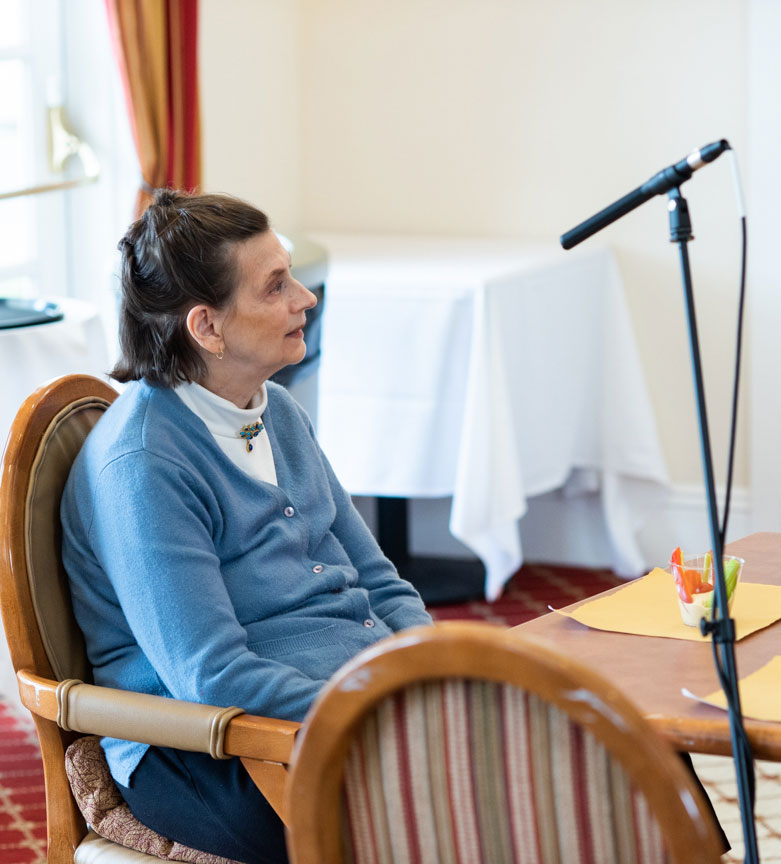Fran Gardner

Lifetime Love of Books Leads Rose Schnitzer Resident to Create New Library System
Growing up in a housing project in Minneapolis, Fran Gardner used to escape to the library.
“There was a library about two blocks away,” said Gardner, 72, who moved into Rose Schnitzer Manor two years ago. “I just loved going there after school. This was when I was between the ages of six and nine, and I’d show my little sister the picture books and just find so much stuff to read. It was a beautiful library, with oak paneling and built-in oak book shelves.”So, when Gardner moved into Rose Schnitzer and found the Marjorie and Jack Saltzman Library needing a little love, she knew she’d found a passion project.
For the past 18 months, Gardner has single-handedly cataloged online all of the 2,665 books by 1,730 authors in the library. She has thinned the collection—there were multiple copies of some recent fiction and many outdated books—and with a few occasional helpers, reorganized books and shelves, and added new sections like self-help, romance, and Yiddish. A favorite new category is “sweetness and light,” books like the Chicken Soup series that “some may find inspiring while others roll their eyes at the perceived insipidness.”
This is a deep collection, there’s a lot of really good literature. I get comments from people that you can always find something to read here.“You have done such a beautiful job!” says a resident, passing through the library as Gardner is sharing the progress of her work. “Thank you,” says Gardner with her trademark self-deprecation and directness. “You know, it’s all done except for I’m adding new books and trying to keep the ones straightened up that are here. I need help with straightening up because it’s hard for me to do. You need to move the books to the front of the shelf, and even them so they don’t push back against the back of the shelf where they can’t be reached.” The business of library-ing has long been in Gardner’s blood. When she was 12, living in Bloomington, Minnesota, Gardner would show up unannounced at the library of her own accord, volunteering to reshelve books. At 14, in Sioux Falls, South Dakota, when she wasn’t allowed access to the adult library books, Gardner’s mother passed along her own library card so young Fran could check out books, to the amusement of the librarians. During her undergraduate years at the University of California, Berkeley, Gardner worked in the Undergraduate, Music and Math-Stat libraries as she was pursuing a bachelor’s degree in English with an emphasis on Victorian literature. “If I had not gotten a job with my local paper in Tulare, California as a Saturday proofreader when I was in high school, I probably would have pursued library science in college,” said Gardner. “I knew a lot about the library.”
This is a very interesting and diverse group of people who are intellectually curious well into their 90s.What’s Gardner’s favorite book? “My favorite is whatever I’m reading now, which is God and the Big Bang. It’s absolutely life-changing. “My current favorite author is a young adult writer named Maggie Stiefvater. She’s so wonderful, I can only read a few pages at a time. Every couple of years, I reread Pattern Recognition by William Gibson. Don’t know why. And the Harry Potters of my childhood were the Narnia series by C.S. Lewis. I was so in love with those books. I remember being surprised in junior high to discover they were allegories. I just read them for the plot.” Gardner, whose maiden name was Pollak, met her first husband, Mark Gardner, working on Berkeley’s The Daily Californian. The two moved to Medford, where Fran Gardner was a reporter for the Ashland Daily Tidings, and then to Portland where she worked at a suburban paper before being hired at The Oregonian. Gardner was an editor, copy editor, reporter and opinion writer at the The Oregonian for 34 years, retiring in 2008 during one of the paper’s numerous buy-outs. She and Mark had two daughters, Lyza Danger Gardner, a programmer who lives in rural Vermont, and Maggie Gardner, who is a professor at Cornell Law School. Fran Gardner has two grandchildren. An early adopter of the Internet, Gardner became interested in computer programming in the early 1980s, and that interest paved the way for the kind of technical prowess needed for library cataloging, which she completed on a free Internet site called librarything.com. In 2004, Gardner married Robert Jaffe, a retired professor of both philosophy and electrical engineering, and the couple lived in southeast Portland. Health troubles (she has a diagnosis of multiple sclerosis) led Gardner to assisted living near her home that she said provided no stimulation with a “library” of about 15 books and no lectures or music. Just before the pandemic, Gardner moved to Rose Schnitzer and took a ground floor room with a view of a giant cedar. “When I originally saw the space,” said Gardner, “I thought nobody would ever take that place because it’s so dark because of the big old cedar. I love that cedar and it called to me and told me I was going to live there. So I do. “This is a very interesting and diverse group of people who are intellectually curious well into their 90s,” she said of RSM’s residents. “My husband is Jewish, but I am not, and about one-quarter of the people here are not Jewish, and we all get along just fine. I like kosher food because I appreciate the humane slaughter of animals, so that was a plus for me--and I don’t miss bacon,” she said with a laugh. “The place is well constructed with a brilliant layout. The grounds and the greenery and the nature path are marvelous.” Gardner is a leader in the community. She chairs the Resident Council and sits on the board of Cedar Sinai Park. She writes frequently for Cedar Sinai’s “Our Stories” feature series. She is on the Rose Schnitzer Manor Food Committee and Cedar Sinai Park’s Development Committee. And then there’s the library. “I have a rich life,” said Gardner. “I quilt a lot and do a lot of handwork including knitting and embroidery. I play the violin. I like to sit and meditate. I am busy in so many different ways than before. And of course, I read.”
Cedar Sinai Now Has Portland’s Only Positive Approach to Care (PAC) Certified Independent Trainer
Staff who have a question about caring for residents with dementia need to look no further than Heather Hess. The Interim Sinai In-Home Care Director is the only Positive Approach to Care (PAC) Certified Independent Trainers in the Portland-area, having recently completed the intensive certification process.
“The certification courses were really kind of awesome because I got a true understanding of the brain and why dementia is happening,” said Hess, 44, who joined Cedar Sinai Park nearly eight years ago as a caregiver in the Harold Schnitzer Center for Living.
Staff who have a question about caring for residents with dementia need to look no further than Heather Hess. The Interim Sinai In-Home Care Director is the only Positive Approach to Care (PAC) Certified Independent Trainers in the Portland-area, having recently completed the intensive certification process.
“The certification courses were really kind of awesome because I got a true understanding of the brain and why dementia is happening,” said Hess, 44, who joined Cedar Sinai Park nearly eight years ago as a caregiver in the Harold Schnitzer Center for Living. “You have pre-coursework before the certification classes, and then the coursework, and then lots of hands-on afterwards to put on a workshop for others about what you’ve learned. And I was working full-time on top of those responsibilities.
“To gain certification, I ended up training all of our caregivers for In-Home Care, so now all of our staff has advanced training in dementia care and they understand the expectations,” added Hess. “Our caregivers now have a level of education in dementia care that sets us apart from everyone else in the local senior living industry.
“The knowledge and skills our staff have are challenging to learn, but they said they now feel like they have a toolbox to work from and can handle clients with Alzheimer’s and behavioral issues much better. They get so excited and proud of themselves when the techniques they’ve learned work.”
PAC is an organization founded by nationally-recognized dementia expert Teepa Snow, who has developed a widely-respected person-centered and engagement-driven philosophy designed to support those living with brain change in a more positive and respectful way.
An estimated 6.2 million Americans age 65 and older were living with Alzheimer’s dementia in 2021 and that number was projected to rise to almost 13 million by 2050. One in three seniors dies with Alzheimer’s or another dementia—more than breast and prostate cancer combined.
“Learning how the brain works and advancing your knowledge as the disease advances is so critical,” says Hess. “There is so much we still don’t know. There are more than 250 types of dementia! We need to be prepared and ready to handle the influx of people who will need care.
“I’m so excited that we now have a consistent tool for us to use.”
Hess wanted to be a caregiver from a young age. “I was in and out of foster care as a kid so I did not have a stable family. Family and taking care of people was the only way I could connect and give back for a loss that I was feeling growing up.”
She started out at age 15 as a hospital candy striper in Ukiah, California, through an ROTC program, changing bed pans and re-positioning catheters among other patient duties.
“Those positions don’t even exist anymore,” said Hess, with a laugh. “It was a very emotional job and it really impacted me at 15. I learned that what we do from when people get sick to when they die is what matters in life.”
Hess earned a bachelor of arts in early childhood development while pregnant with her first child, who is high-functioning autistic, desiring extra skills to help her daughter.
“And then my husband and I moved to Oregon to take care of my elderly in-laws, so caregiving professionally was already kind of naturally lining up with what I was doing at home.
“I did my homework and Cedar Sinai Park was the only place I could find where I knew I could grow in my career. Also, Cedar Sinai Park had a reputation for having long-term employees, which is really what you’re looking for in a company. When a place has a lot of long-term employees, that says something solid about the company, and that’s what led to my decision to start here.”
Hess was client caregiver for Sinai In-Home Care for several years, training all the new hires. Even as Interim Director of Sinai In-Home Care, she is out in the field conducting client intakes, and develops and updates care plans, troubleshoots, and has quarterly client monitoring visits. She also attends job fairs, handles paperwork, coordinates staff in-services, and sits on several Cedar Sinai committees. Some of her clients are residents at Rose Schnitzer Manor where she is remembered as the “Flower Lady” for the various colorful flowers stuck in her up-do.
“I think we have a higher level of respect here than you get in any other outside senior agency,” said Hess. “It’s easy to talk to anybody here. If you have an issue, it’s dealt with; you’re not stuck waiting for a solution because of the comfortability level amongst staff and supervisors.
“Our residents and clients are truly are so important to me because they are an extension of our loved ones,” said Hess. “We might not be blood-related, but they live here long enough that they are family, and I love them like family. I really do.”
###


